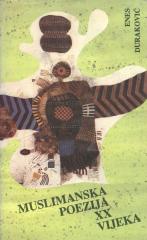Mak Dizdar
Croatian and Bosniak poet (Stolac, October 17, 1917 – Sarajevo, July 14, 1971). Graduated from high school in Sarajevo. He worked as a journalist, clerk and editor in journalism and publishing, and from 1952 he was a professional writer. He wrote poems, plays, plays and essays. He prepared several anthologies of folk poetry, old Bosnian texts and anthologies.
The first (censored) collection Vidovopoljska noć (1936), under the influence of A. B. Šimić, T. Ujević and H. Huma, was socially intoned. Eroticism and surrealistic imagery are the hallmarks of the love poems in Plivačica (1954) and the collection Koljena za Madonu (1963), which are characterized by muted Eastern mysticism and the melancholic echo of sevdalinka, and love raised to the absolute level by Ujević. The space and motif of the circle acquire a symbolic meaning in the collection Okrutnosti kruga (1960), where the exalted image of the world and infinity (Desert) gives way to a dualistic vision modeled on the Bosnian patarenes. In the collections Return (1958), Miniatures (1965) and Islands (1966), Dizdar summarized his creativity in the sign of a dualistic picture of the world and the search for meaning, and he reached his artistic peak in The Stone Sleeper (1966). In the balladic tone of the mythical singer, Dizdar talks about medieval Patarena Bosnia, about the tragic fate of its people (Zapis o zemlji, Gorčin), about eternal love (Kosara), faith and doubt. The messages from the stećak to the poet are only an occasion for the artistic clarification of some important issues of human survival and take on general meanings, and the emblematic Stone Sleeper a general symbolism. The poem Blue River symbolically signifies Dizdar's ever-present understanding of the ethical meaning of the poetic act. Dizdar's speech is based on archaisms and traditional forms of repetition. His verse is elliptical and his style is narrative and gnomic with reflections of oral and Adjami poetry. He used the linguistic treasure of folk prayers, laments, bulgaršćica, questions, bajalic, counters, legends and traditions, and was enchanted by the playfulness and magic of the anonymous folk singer, his speech formulas, motifs and characters from folk tales, and he also used biblical motifs.
Due to his interest in heritage, Dizdar joined the poetry of the Krugava generation. Having entered Croatian literature "of his own free will and publicly declared decision" (D. Jelčić), he is represented in all anthologies of Croatian poetry.
